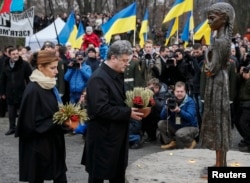During a weekend commemoration for millions who died of starvation in Ukraine in the early 1930s, President Petro Poroshenko lashed out at Soviet-era totalitarianism for causing the deaths and accused today’s Russian-backed rebels in the east of using similar tactics.
Soviet leaders refused to acknowledge the famine of 1932 and 1933. They also confiscated grain supplies and prevented travel to find food, leading to what some call a Soviet-engineered "genocide."
The tragedy known as Holodomor never would have happened if Ukraine had been an independent, democratic country, Poroshenko said Saturday.
"And, for the first time in almost 100 years, the Ukrainian parliament will not have any communists – this 'fifth column' that shares the responsibility for the genocide of Ukrainian people," Poroshenko said, adding that communists have been relegated to the "trash can of history."
He called the Russia-backed rebels fighting in the east the "successors of Stalin" and accused them of repeating "criminal experiments" from the time of Holodomor.
Hearing echoes of history
"Today the enemy is trying to detach us again, disunite us, make us fight, to drive a wedge between us," Poroshenko said. "Today we need to be united more than ever."
The commemoration was attended by ambassadors from the United States and several other nations that call Holodomor an act of genocide against the Ukrainian people.
Russia, the center of the former Soviet Union, does not consider the 1930s event an act of genocide and has pointed out that other former republics suffered from famine as well.
Most Ukrainians had relatives who died during the two-year period.
"My family has also suffered," said Nina Marchenko, an editor. "I was born in '56 but I don't remember my grandmothers and grandfathers, especially my grandmother Kristina who died in '33. They died during Holodomor."
Renewed public commemoration
Saturday's event marked the first state-sponsored, public commemoration of the tragedy in years. Former president Viktor Yanukovych, who was ousted earlier this year, toned down previous ceremonies in support of the Kremlin line.
"Yanukovych was trying not to talk about the crimes of the Soviet past," said Volodymyr Viatrovych, director of the Ukrainian Institute of National Memory. "They started to close archives that contained material about crimes committed during Soviet times. And, on the contrary, they started to renew some Soviet traditions."
Ukraine's Western-backed leaders say they will push for the country's independence and a European future, despite thousands of deaths in fighting in the east.






